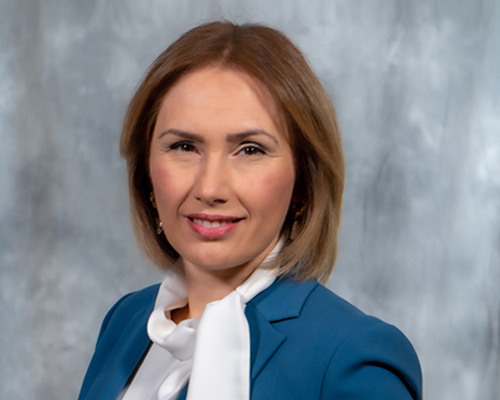
Lindita Camaj
Director of Graduate Studies, Associate Professor
Communication Bldg
713-743-1656
lcamaj@central.uh.edu
Lindita Camaj is an assistant professor at the Jack J. Valenti School of Communication, University of Houston. She received her PhD at the Indiana University. Her broad research interests include news media role during electoral campaigns, agenda-setting effects, Freedom of Information (FOIa) legislation, and state–press relationships in Eastern Europe. As a multi-method scholar grounded in the agenda setting and agenda building scholarship, her research explores individual and societal factors that determine the impact of mass media on how we perceive and engage with the political world.
Her scholarly work has been awarded by the Association for Education in Journalism and Mass Communication (AEJMC) and published at numerous high impact journals at the intersection of mass media, technology, politics, international communication and journalism studies. Prior to entering academia, she has worked as a professional journalist in the Balkans, covering public affairs and elections for local and international media.
Education
- Ph.D. in Mass Communication (2011), Indiana University, Bloomington, IN
- M.A. in Mass Communication (2005), Indiana University, Bloomington, IN
- B.A. in English Language and Literature (2001), University of Pristina, Kosovo
Teaching
- COMM 6310 Mass Communication Theory and Research
- COMM 7397 Media and Politics
- COMM 6397 Media and Globalization
- COMM 4397 Data Journalism
- COMM 4397 Media and Electoral Campaigns in The Digital Age
- COMM 4314 Social Issues in Journalism
- COMM 4310 Opinion Writing
- COMM 1301 Media and Society
Selected Publications
- Camaj, L. (2019). From Selective Exposure to Selective Information Processing: A Motivated Reasoning Approach. Media and Communication, 7, 3. DOI: 10.17645/mac.v7i3.2289
- Camaj, L., Northup, T. (2019). Dual-Screening the Candidate Image during Televised Debates: The Moderating Role of Twitter and Personality Traits for the Effects of Presidential Debates on Candidate Perceptions. Journal of Broadcasting and Electronic Media. https://doi.org/10.1080/08838151.2019.157411
- Ardent, F., Northup, T. & Camaj, L. (2019). Selective exposure and news media brands: Implicit and explicit attitudes as predictors of news choice. Media Psychology, 22(3), 526-543. DOI: 10.1080/15213269.2017.1338963
- Camaj, L. (2018). Motivational Theories of Agenda-Setting Effects: An Information Selection and Processing Model of Attribute Agenda-Setting. International Journal of Public Opinion Research. https://doi.org/10.1093/ijpor/edy016
- Camaj, L. (2018). Blurring the boundaries between journalism and activism: A transparency agenda-building case study from Bulgaria. Journalism,18(7), 994-1010. doi:10.1177/1464884916677757
- Camaj, L. (2016). Between a rock and a hard place: Consequences of media clientelism for journalist-politician power relationships in the Western Balkans. Global Media and Communication. doi:10.1177/1742766516675649
- Camaj, L. (2016). From ‘window dressing’ to ‘door openers’? Freedom of Information legislation, public demand, and state compliance in South East Europe. Government Information Quarterly. doi:10.1016/j.giq.2016.03.001
- Camaj, L. (2016). Governments’ uses and misuses of Freedom of Information laws in emerging European democracies: FOI laws’ impact on news agenda-building in Albania, Kosovo, and Montenegro. Journalism and Mass Communication Quarterly, 93(4), 923-945 DOI: 10.1177/1077699015610073
- Camaj, L. & Santana, A. (2015). Political deliberation on Facebook: the role of moderator and political ideology for online deliberation. Journal of Information Technology & Politics, 12(4). Doi:10.1080/19331681.2015.1100224
- Santana, A., & Camaj, L. (2015). Facebook as a campaign tool during the 2012 elections: A new dimension to agenda setting discourse. The Journal of Social Media in Society, 4,2. http://www.thejsms.org/index.php/TSMRI/article/view/109/61
- Camaj, L. (2014). The consequences of agenda-setting effects for political trust, participation, and protest behavior. Journal of Broadcast and Electronic Media, 58, 4, 634-654. DOI: 10.1080/08838151.2014.966363
- Camaj, L. (2014). Need for orientation, selective exposure and attribute agenda-setting effects. Mass Communication and Society, 17, 689-712. doi: 10.1080/15205436.2013.835424
- Camaj, L. (2014). Media use and political trust in an emerging democracy: Setting the institutional trust agenda in Kosovo. International Journal of Communication 8. http://ijoc.org/index.php/ijoc/article/view/2107
- Camaj, L. (2013). The media’s role in fighting corruption: Media effects on governmental accountability. The International Journal of Press/Politics, 18, 21-42. doi: 10.1177/1940161212462741
- Camaj, L. & and Weaver, D. H. (2013). Need for orientation and attribute agenda-setting effects during a U.S. election campaign. International Journal of Communication 7. http://ijoc.org/index.php/ijoc/article/view/1921
- Camaj, L. (2010). Media framing through stages of a political discourse: International news agencies’ coverage of Kosovo’s status negotiations. Journal of International Communication Gazette, 72, 635-653. doi: 10.1177/1748048510378147
- Camaj, L. (2010). Gate-keeping the gatekeepers: International community and Freedom of Information in Kosovo. Global Media Journal, 10 (7). http://lass.purduecal.edu/cca/gmj/fa10/graduate/gmj-fa10-grad-article8-camaj.htm
- Camaj, L. (2010). Media effects in a transitional society: Setting the political agenda in the Kosovo elections of 2007. Central European Journal of Communication, 3 (2), 269-282. http://ptks.pl/cejc/wp-content/uploads/2012/07/CEJC_Vol3_No2_Camaj.pdf
- Ogan, C., Bashir, M., Camaj, L., Luo, Y., Gaddie, B., Pennington, R., Rana, S., & Salih, M. (2009). Development communication: The state of research in an era of ICTs and globalization. Journal of International Communication Gazette, 71, 655-670. doi: 10.1177/1748048509345060
Honors
- Small Grants, Division of Research, University of Houston, 2019, $4,880
- Research Progress Grant, CLASS, University of Houston, 2019, $3,700
- Top Paper Award, 2018, Electronic News Division, Association for Education in Journalism and Mass Communication (AEJMC)
- Outstanding Research Award, 2017, Valenti School of Communication, University of Houston.
- Carnegie Whitney Grant, 2017, “Storytelling with Data: A Resource Guide for data Journalism”, $4,900
- Emerging Scholars Award, 2015, Association of Education in Journalism and Mass Communication
- Research Progress Grant, 2015, University of Houston, $3, 000
- Small Grants Award, 2015, University of Houston, $3,000
- New Faculty Research Award, 2012-2013, University of Houston, $6,000